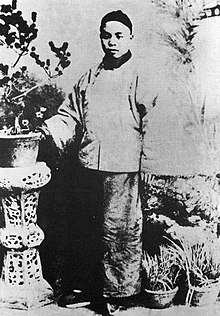| Lin Xu | |
|---|---|
| 林旭 | |
 | |
| Born | 1875 Houguan, Fujian (now Fuzhou) |
| Died | 28 September 1898 Caishikou, Beijing |
| Cause of death | Beheading, Execution |
| Nationality | Qing Dynasty China |
| Occupation(s) | Government official, reformer, scholar, writer |
| Known for | Advocacy of political reform |
| Movement | Reformist faction, Late Qing Dynasty |
Lin Xu (Chinese: 林旭; 1875 – 28 September 1898), courtesy name Tungu (暾谷), was a Chinese politician, scholar, songwriter and poet who lived in the late Qing dynasty. He was also a student of Kang Youwei, a prominent official and one of the leaders of a reform movement in the late Qing dynasty.
Lin Xu was one of the "Six Gentlemen of Wuxu". On September 28, 1898, he was executed at Caishikou Execution Grounds in Beijing via decapitation.
Biography
Lin Xu was born in Houguan (侯官), which is now Fuzhou, Fujian. He took the imperial examination locally and obtained the position of a "Jieyuan" (解元) in 1893. In 1895, he was appointed as an official in the Qing imperial court by the Guangxu Emperor.
In April 1898, in response to foreign imperialism and internal political turmoil within the Qing government, Lin co-founded the State Protection Association (保國會) with others to oppose colonialism. He fought for radical social, educational and political reforms in China. As one of the Six Gentlemen who attempted to implement the Hundred Days' Reform programme with backing from the Guangxu Emperor, Lin advocated a radical position in which China adopt a modern-style government and convert the absolute monarchy system into a constitutional monarchy.
However, on 21 September 1898, the conservative faction in the Qing government, led by Empress Dowager Cixi, saw the Hundred Days' Reform programme as a foreign plot to overthrow the government. The State Protection Association was disbanded, and the Hundred Days' Reform was terminated, while the Six Gentlemen were arrested and imprisoned. Seven days later, on 28 September, Empress Dowager Cixi ordered the Six Gentlemen to be executed and beheaded outside Xuanwu Gate in Beijing.
References
- Yang Tianshi (1 August 2011). The End of Imperialism: A Concise History of the Xinhai Revolution. Yuelu Press. pp. 68–. ISBN 978-7-80761-636-8.
- Jasper Becker (2008). City of Heavenly Tranquility: Beijing in the History of China. Oxford University Press. pp. 97–. ISBN 978-0-19-530997-3.
- "Lin Xu before and after the Wuxu Reform". People's Daily. 2017-02-23.
- Patrick Fuliang Shan (14 November 2018). Yuan Shikai: A Reappraisal. UBC Press. pp. 84–. ISBN 978-0-7748-3781-1.
- Xinhua Digest. People's Publishing House. 2004. pp. 72–.
- History of Chinese Literature: Modern Volumes. Jilin People's Publishing House. 1998.
- Fuzhou Old Pictures. People's Fine Arts Press. 2000. ISBN 978-7-102-02191-1.
This article about a Chinese politician is a stub. You can help Misplaced Pages by expanding it. |